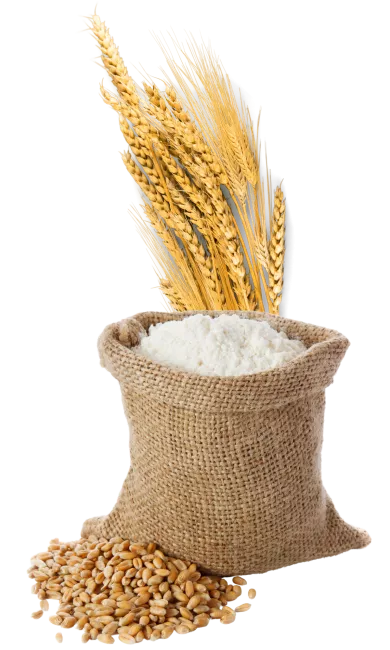Wheat is the most widely-cultivated grain type in the world. The processing of wheat results in various high-grade sources of nutrition that are highly suitable for human or animal consumption. Examples of this include flour and wheat starch.
As a foodstuff, wheat is most commonly present in products that contain flour or meal. The processing of wheat, often in the form of flour, leads to various co-products, such as wheat gluten, wheat groats and wheat starch. Some of these co-products are used in the production of food for human consumption. However, there are by-product flows that are not suitable for this. These co-products are far from worthless, though. They can be used as high-grade materials in animal feed for pig, dairy and beef cattle farming and as a source of nutrition for insects.
Wheat starch is produced by separating the gluten and the starch from the wheat. First, the bran is removed from the wheat grains. Next, the wheat is ground and washed, leaving the starch. Wheat starch as a by-product for animal feed generally comes in liquid form. r.
Would you like to know more about the application possibilities of wheat starch?


What is wheat starch used for?
Wheat starch for pig and cattle farming
Wheat starch is full of highly digestible nutrients. It is a suitable energy source for pigs and cattle farming, among others. As such, wheat starch is a popular product in many basic rations.

Wheat starch for insects
Wheat starch and other co-products, such as potato steam peels, brewer's grain and yeast are all excellent additions to a tasty and balanced ration for insects.
Curious about the possibilities?
Wheat starch for pig farming
ooo
Wheat starch is a popular product used in the base ration for pigs. It is a common product in pig farming, alongside potato steam peels, dairy products and wheat yeast concentrate.
As the name suggests, wheat starch consists of starch. Starch is a carbohydrate that the body turns into glucose. This makes it an important source of energy for the animal. The proteins in the product make up the building blocks of the body and positively impact the growth, milk production and reproduction of the pig. The acids it contains, i.e. lactic acid and acetic acid, add a tasty, refreshing flavour and benefit the intestinal flora.
The dry matter relative to the total ration is max. 15% for weaned piglets and between 20% and 25% for porkers and sows.
Wheat starch for cattle farming
ooo
Wheat starch is suitable for dairy and beef cattle farming.
Wheat and wheat starch are highly digestible sources of energy for dairy and beef cattle. This takes the form of rapid rumen energy. The wheat starch increases the protein content of the feed, and, thanks to its low pH value, it reduces heat generation. The fluid wheat starch also adds stickiness to the ration. This way, food selection by the cows can be prevented, thus increasing feed efficiency.
Would you like to know more?
Storage and shelf life of wheat starch
The wheat starch is delivered by tanker vehicle in loads varying from 28-35 tonnes.
Het tarwezetmeel wordt vervolgens opgeslagen in een zuurbestendige silo The wheat starch is then stored in an acid-resistant silo or bunker. Wheat starch has an average shelf life of 3 months. Note that it is important to regularly clean your feed silo or bunker. Consistency and stability are incredibly important aspects of the feed ration. We recommend feeding regularly, to prevent the product from sagging. This way, you can prevent segregation and make sure all animals receive the same nutrients. As such, it is important to use an agitator.
Would you like more information or do you have any questions about the storage and shelf life of wheat starch?
Wheat starch at Looop
At Looop, we have various types of wheat starch. This wheat starch comes from various producers and production locations, including Ibbenbüren and Hamm. The co-products are not only a high-grade resource, but are also highly sustainable, reduce CO2 emissions and save costs. Our various types of wheat starch are highly suitable alternative resources for animal feed for pigs, dairy and beef cattle and insects.
View our wheat starch assortment.
Do you have any questions about wheat starch for pig farming?
Our manager Jasmijn is happy to help you!
Jasmijn van Wakeren
Quality, Nutrition & Sustainability Manager

Do you have any questions about wheat starch for cattle farming?
Our manager Joost is happy to help you!
Joost van de Wijgert
Sales Manager

Curious about suitable wheat starch for insects?
Kelly is happy to help you consider the various options!
Kelly Vermeer
Manager Strategic Business Development

Veel gestelde vragen over Tarwezetmeel
- What is wheat starch?
-
Wheat starch is a type of starch harvested from the grain type wheat by processing the wheat grain. The brans are removed from the wheat grain. Afterwards, the grain is ground and washed. Wheat grain is available as a dry product, but it is usually liquid when produced as a co-products.
- Is wheat starch suitable for pigs?
-
Wheat starch is highly suitable food for pigs. The starch serves as an energy source for the pigs, and the proteins positively contribute to their growth, reproduction and milk production. As such, it is a popular co-products in many basic rations.
- Is wheat starch suitable for cattle?
-
Wheat starch is a highly digestible energy source for Cattle. The liquid wheat starch prevents food selection, as it adds stickiness to the ration. This will result in improved feed efficiency. As such, wheat starch is a highly suitable product for cattle.
- Is wheat starch suitable for use as animal feed?
-
Co-products, which include wheat starch, are a sustainable source of nutrition for animals. They contain essential nutrients that are indispensable to the animal. Wheat starch, for example, is a product rich in starch, which means it contains lots of energy. Wheat starch and other co-products are very tasty, financially attractive, and generally have a lower CO2 footprint.
- What is the feed value of the co-products wheat starch?
-
Various types of wheat starch are available. These types have different feed values. At Looop, we show these nutritional values for each product in a neatly organised matrix. If you create a MijnLooop account, you'll automatically receive an update if the matrix is changed. That way, you're always the first to hear when something changes.





